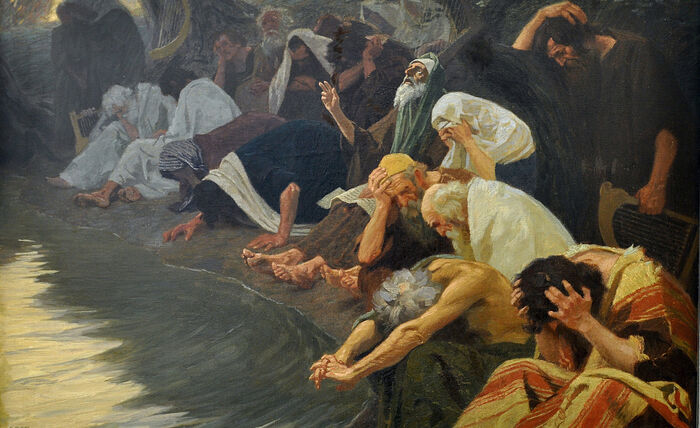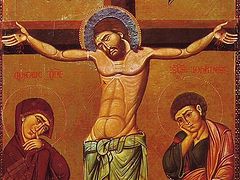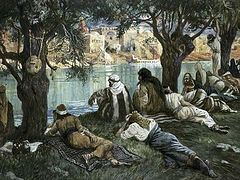This past Sunday was the Sunday of the Prodigal Son, the second preparatory week for Great Lent. The day before, at the All-Night Vigil, the 136th Psalm, “By the Rivers of Babylon,” is sung. We present to the readers of OrthoChristian.com a theological-philological commentary on this hymn.
Great Lent is preceded by four preparatory weeks. In this period, the Lenten Triodion offers a number of liturgical texts that prepare us for Great Lent. Thus, at Matins for the Sunday of the Prodigal Son and then for the Sundays of Meatfare and Cheesefare, after the singing of the Polyeleos Psalms (134 and 135), “Praise the Name of the Lord” and “O Give Thanks Unto the Lord,” Psalm 136—“By the Rivers of Babylon”—is also sung.
In its instructions for Matins for the Sunday of the Prodigal Son, the typikon prescribes that to the two psalms of the Polyeleos we add a third: “By the Rivers of Babylon,” with the beautiful alleluia. We can note that, in prescribing this psalm to be sung this way, the typikon distinguishes it from the two preceding psalms.
The 136th Psalm consists of nine verses. In the Church Slavonic Bible, it is titled: “To David, a work of Jeremiah.” In the Hebrew Bible, there is no inscription of the author’s name, and in the Latin and Greek Bibles there is just the name of David.
There are various opinions about the author of Psalm 136. The strong feeling of homesickness vividly expressed in it (vv. 5-6) suggests that the author was among those captives who, after the decree of the Persian King Cyrus in 538 BC, returned to the ruined Jerusalem.
The text of Psalm 136 is as follows:
To David, a work of Jeremiah
By the rivers of Babylon, there we sat down, yea, we wept, when we remembered Zion. We hanged our harps upon the willows in the midst thereof. For there they that carried us away captive required of us a song; and they that wasted us required of us mirth, saying, Sing us one of the songs of Zion. How shall we sing the Lord's song in a strange land? If I forget thee, O Jerusalem, let my right hand forget its skill. If I do not remember thee, let my tongue cleave to the roof of my mouth; if I prefer not Jerusalem above my chief joy. Remember, O Lord, the children of Edom in the day of Jerusalem; who said, Rase it, rase it, even to the foundation thereof. Wretched daughter of Babylon! blessed shall he be who shall reward thee as thou hast rewarded us. Blessed shall he be, that taketh and dasheth thy infants against the stones.
The Babylonian captivity
By the rivers of Babylon—the usage of the plural in “by the rivers” refers to the various areas along the Tigris and Euphrates with their tributaries and artificial canals made by the Babylonians to irrigate their fields, where the captive Jewish families lived.
The plural of the verbs, we sat down, yea, we wept refers to the captives’ fellowship among themselves. They weep together and empathize with one another, remembering Zion—in this case, the word is associated with Jerusalem or the Temple.
Our harps—here, in the Greek text, is the word ὄργανα (organ). It was borrowed into the Church Slavonic text without translation. In Russian, it is translated as “instruments,” and in reading the Synodal Translation (based on the Hebrew—Trans.), we understand that it’s talking about musical instruments: We hanged our harps. Musical instruments hung on trees means the Jews had laid mirth aside.
From its very first verses, the hymn “By the Rivers of Babylon” reveals the whole meaning of Great Lent. We are in captivity to sin—“by the rivers of Babylon.” Like the Jews, we have to lay mirth aside and reflect upon our sins and remember Zion—the Heavenly Kingdom, or the Heavenly Jerusalem.
Songs of Zion
Required—the Babylonian captors required that the Jews tell them a few lyrics from the Divine hymns and praises they sung in Jerusalem.
How shall we sing the Lord's song in a strange land?—” Why were they not permitted to sing in a strange land? Because unclean ears mustn’t hear these mystical hymns,” St. John Chrysostom comments on this verse (Commentary on the Psalms).
A strange land is not just a country far from the holy city—it is an unclean pagan land (cf. Ezek. 4:13-14) that gave “defiled bread.”
St. John Chrysostom calls us to watch over ourselves with special care and build a real life in which we do not become captives, strangers to our father’s city and cut off from it. “Let us hear all this and learn from it. Just as they began to seek their city when they were deprived of it, so many of us will experience the city when we are deprived of the Jerusalem on high on that day,” St. John comments on Psalm 136 (Commentary on the Psalms).
Jerusalem—the chief joy
If I forget thee, O Jerusalem, let my right hand forget its skill. If I do not remember thee, let my tongue cleave to the roof of my mouth; if I prefer not Jerusalem above my chief joy—the fifth and sixth verses are built upon the principle of an oath: “If I forget, let my right hand forget me; if I don’t remember, let my tongue cling to my palate.” The author of the psalm is ready to be punished for violating his vows, that is, if he doesn’t make Jerusalem his chief joy, may the Lord deprive him of the ability to play the harp with his right hand and forbid his tongue to sing the songs of Zion.
The singing of this psalm in the period of preparation for Great Lent calls us to make the chief of our joy to be Jerusalem—the Kingdom of Heaven.
The children of Edom
Turning to God, the Psalmist prays the Lord that He might remember the evil deeds of the Edomites, which they committed during the destruction of Jerusalem in 587 BC (cf. Obad. 1:10-15): Remember, O Lord, the children of Edom in the day of Jerusalem; who said, Rase it, rase it, even to the foundation thereof.
The Edomites are a kindred people to the Jews—they were always hostile towards their brethren and always took an active and evil part in all the sorrowful events of their lives (cf. Am. 1:11).
And the day of Jerusalem—the day when Jerusalem was razed down to its very foundations, the city was deprived of its defensive walls and towers, becoming as if naked (cf. Is. 3:17).
Daughter of Babylon
Wretched daughter of Babylon! blessed shall he be who shall reward thee as thou hast rewarded us—in the Russian translation of the psalm, the daughter of Babylon is called the “devastator.” The Greek text calls her “unhappy” (ταλαίπωρος), hence the word “wreteched” or “accursed”—unhappy, pitiful.
The unpleasant expression, Blessed shall he be, that taketh and dasheth thy little ones against the stones, according to some commentaries on the Psalter, indicates the rude and inhumane features of the Israelite religion. Whatever we think of these words of the psalm, the Psalmist most likely does not desire the death of all the innocent children of Babylon, but entreats the Lord to remind the very specific destroyers of what they have done to Zion.
Many things can be compared to infants in the spiritual life—it’s an image of the beginnings of small indulgences and discontentment that can grow into deep, ineradicable passions and vices. Now they seem so small and defenseless that it even seems too severe to resist them. But it’s precisely at this initial stage that it’s necessary to do battle with them—Blessed shall he be, that taketh and dasheth thy infants against the stones.
***
The 136th Psalm, sung only thrice a year during the All-Night Vigil in the preparatory weeks before Great Lent, shows us the great disappointment of the Jewish people at having lost their holy site—Jerusalem. The text also calls us to contemplate the value of the great benefits that the Lord gives us.
Without any doubt, the sorrow and tears of the Hebrew captives should inspire us to cherish all the gifts sent us by God.





